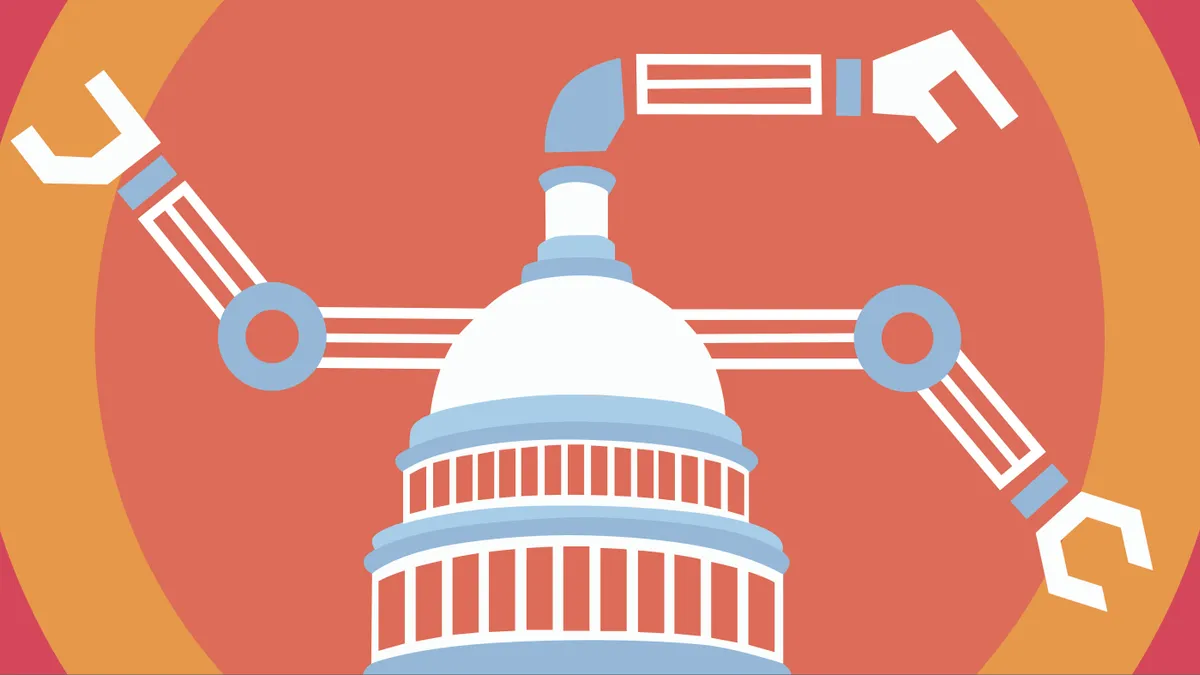Editor's Note: The following is a weekly column covering technology and regulation within the supply chain and logistics industries.
Reg 'n' tech talk: Feds and industry leaders discuss AVs
The U.S. Department of Transportation, state and local officials and industry leaders along the supply chain gathered March 1 to discuss autonomous vehicles (AVs) and their implications for society and the economy.
The big themes: AVs will not steal trucking jobs, AVs and automation will create new jobs, AVs could help prevent accidents and fatalities on the road, the U.S. wants to be No. 1 in AV innovation.
You can read Smart Cities Dive's scoop here.
They also announced AV 3.0, a research project that will outline how AVs will affect ports, rail, trucking and mass transit.
DOT Secretary Elaine Chao said we won't see AV 3.0 until at least summer, but in the meantime, California said automakers can go ahead and test AVs on state roads in April, according to Axios.
The Reaction: Various industries are chomping at the bit to develop AVs and start testing them, but the federal government is still hesitant and wants to make sure it has all the information it needs to provide guidelines to ensure safety, which Chao said is DOT's No. 1 priority.
Here are 19 companies working on blockchain
CB Insights released a list of 19 prominent corporations working on blockchain, which, it turns out, are mostly freight companies, 3PLs, financial firms, and — get ready for it — grocers.
Some notable names on the list: Microsoft, Goldman Sachs, Maersk, UPS, FedEx, BNSF Railway, Walmart, Unilever, Tyson, Kroger, Dole and McCormick.
The Reaction: Blockchain is no longer a buzzword for many companies; it's an actual innovative initiative that many believe could legitimately transform how they do business. Blockchain has big implications for supply chains, which Supply Chain Dive has covered extensively. You can read more here.
JD.com: The new tech leader
Speaking of CB Insights, the research firm also released a report on the future of retail last week, which puts artificial intelligence (AI) in the spotlight as the top tech solution for retailers of the future.
Then Chinese e-commerce company JD.com released its Q4 2017 earnings, revealing heavy investment in AI and blockchain solutions. JD.com is growing exponentially, and it might be because the company has figured out how to manipulate AI to manage inventory and basic operations and gauge consumer interest, demands and satisfaction.
Just as a reminder, the top e-commerce site in the U.S. — Amazon — has also been investing heavily in AI and automation.
TechCrunch said JD.com launched a new blockchain accelerator last week, aiming to help AI and blockchain startups get a running start in the tight tech market.
The Reaction: JD.com is not only investing in AI and blockchain for its own operations, but it's throwing money at other young companies doing the same thing. JD.com's continued success might be an indicator to other e-commerce companies and retailers that CB Insights' research is correct: AI is the future.
In case you missed it...
UPS is testing EVs, and California-based GSC Logistics tested an electric truck at the Port of Oakland last week.
Trump slapped steel and aluminum imports with tariffs, which were roundly condemned by the international community except China, even though China expressed dissatisfaction with the tariffs when the plan was originally announced in February.
China produces half the world's steel, but U.S. companies consider it cheaply made, and don't buy much of it, so if anything, the tariffs won't hurt China but will prompt U.S. companies to buy more steel from U.S. companies.
That means more cash flow for U.S. business, and potentially more jobs.
Looking ahead
According to Politico, Rep. Bill Shuster wants to pass the FAA bill sitting in Congress by August recess. In other news, Bloomberg reported that there will be an infrastructure funding hearing on March 7, according to anonymous sources.














